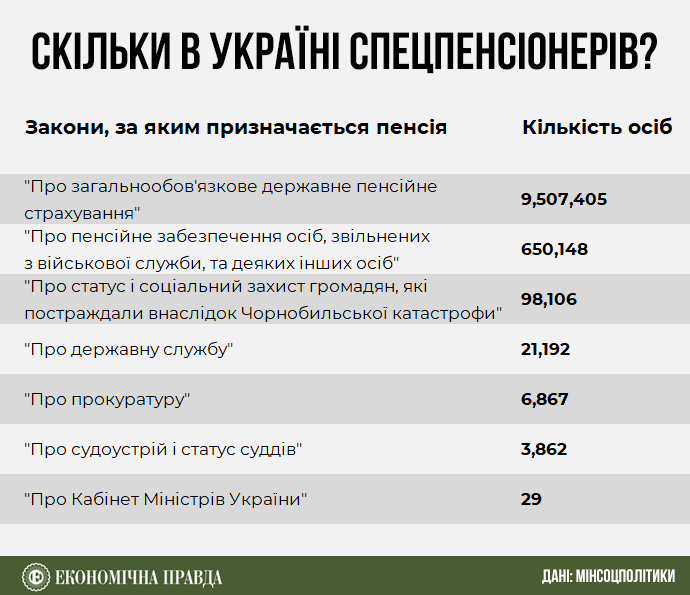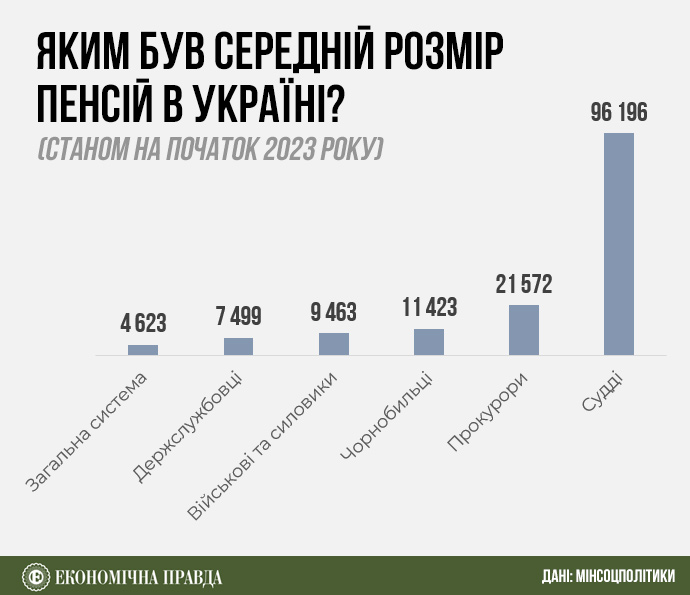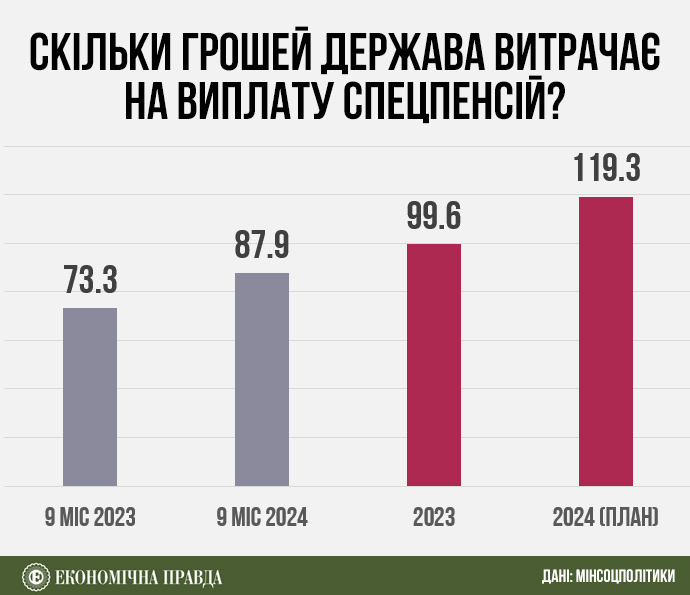Скандал вокруг прокуроров, получивших статус лиц с инвалидностью, уже успел привести к решению о ликвидации медико-социальных экспертных комиссий (МСЭК) и отставке генерального прокурора. После внутренних проверок оказалось, что в отдельных областях более четверти прокуроров являются лицами с инвалидностью. По крайней мере, официально.
Такой статус дает им некоторые льготы при трудоустройстве или переводе на другое место работы, а также право получать немалые пенсионные выплаты. Как удалось выяснить изданию Экономическая правда , около 20% прокуроров указали в своих декларациях, получавших пенсионные выплаты. Однако, как показало подробное углубление в эту тему, далеко не все эти пенсии касаются инвалидности.
По данным Министерства социальной политики, в Украине насчитывается 525 действующих и бывших прокуроров, получающих пенсии по инвалидности. Из них 52 человека получили этот статус и соответствующую пенсию в течение 2022-2024 годов. То есть большинство из 6867 прокуроров-пенсионеров получают пенсию за выслугу лет.
По закону пенсия прокурора (и за выслугу лет, и в случае инвалидности) должна составлять 60% от его зарплаты, но не может превышать десяти прожиточных минимумов для лиц, потерявших трудоспособность, то есть 23 610 грн. На практике пенсии прокуроров достигают десятков, а иногда и сотен тысяч гривен в месяц. Неплохой «бонус» к зарплате, который еще не облагается налогом.
Как прокурорам удалось обойти закон и получать заоблачные пенсии и кто злоупотребляет щедростью государства?
Особые пенсии
Большинству украинцев для выхода на пенсию необходимо достичь пенсионного возраста – 60 лет, а также иметь 35 лет трудового стажа, то есть периода, в течение которого работодатель платил за будущего пенсионера взносы в Пенсионный фонд. Если эти требования выполняются, то человек получает право на пенсию, размер которой составляет 35-40% от его средней зарплаты.
Такие условия действуют для большинства, но не для всех украинцев. За годы независимости законодатели создали классы лиц, пенсию которых регулирует не общий закон «Об общеобязательном государственном пенсионном страховании», а отдельные, специальные законодательные акты. Такие спецпенсионеры могут получать выплаты от государства гораздо раньше, чем рядовые граждане, и выплаты для них гораздо выше, чем в среднем по стране.
К примеру, условия выхода на пенсию прокуроров прописаны в законе «О прокуратуре». Согласно ему, прокуроры получают право на пенсионные выплаты, имея 25 лет трудового стажа, из которых 15 лет – на должностях в прокуратуре. Закон определяет, что размер прокурорской пенсии должен составлять 60% его зарплаты.
То есть закон позволяет прокурорам получать надбавку в размере 60%, с которой не приходится платить налоги. Для этого не нужно оформлять фиктивную инвалидность.
Однако у этой щедрости есть свои пределы: в свое время законодатели внесли изменения в прокурорский закон, ограничив максимально возможный размер пенсии прокуроров десятью прожиточными минимумами для лиц, потерявших трудоспособность. В 2024 году это 23610 грн в месяц.
Такое ограничение действует не только для прокуроров, но и всех граждан. Однако, в отличие от большинства украинцев, прокуроры научились эффективно его обходить. Поверхностный обзор их деклараций показал, что некоторые из них получают пенсии, в разы превышающие законодательное ограничение.
Например, руководитель Специализированной прокуратуры в сфере надзора за уголовными производствами о военных преступлениях Григорий Рябенко указал в своей декларации за 2023 год пенсионные выплаты более чем на 1 млн грн (в среднем 83,5 тыс. грн в месяц).
Начальник отдела Харьковской прокуратуры Александр Шевченко задекларировал 1,21 млн. грн. пенсионных выплат (101 тыс. грн.), а заместитель прокурора Ровенской области Валерий Патрикей — почти 1,4 млн. грн. пенсии (116,35 тыс. грн.). Как прокурорам удается получать такие выплаты?
Как обойти закон
Обойти пенсионный потолок прокурорам помогают судьи. При этом работники Фемиды не только назначают пенсию, более десяти прожиточных минимумов, но и больше установленных законом 60% от зарплаты.
“Значительное количество прокуроров и пенсионеров силовых органов через суд оспаривают еще более выгодные условия исчисления пенсий. Например, ее расчет в размере 90% денежного довольствия или заработной платы действующего работника соответствующего органа”, – сообщили ЭП в Министерстве социальной политики.
Более того, прокуроры через суд требуют назначить им пенсию, даже не имея необходимого трудового стажа 25 лет, из которых по крайней мере 15 – на должностях в прокуратуре. Чтобы понять, как им удается бороться за государство ничем не ограниченные пенсии, следует пересмотреть несколько судебных решений о назначении пенсий.
Сначала прокурор обращается в Пенсионный фонд, чтобы ему назначили пенсию по специальному закону. Часто ПФ на такие обращения отвечает отказом, поскольку у прокурора нет необходимой выслуги лет.
Получив отказ прокурор обращается в суд и требует перечислить его трудовой стаж, а также рассчитать пенсию, которая превышает 60% от его заработной платы. В своих доводах истец ссылается не в действующий закон «О прокуратуре» от 2015 года, а на утративший силу закон от 1991 года. Причем не на последнюю его редакцию, а на действовавшую с 2001 года.
Но редакция старого закона «О прокуратуре» определяла совсем другие правила выхода прокуроров на пенсию. Согласно ей, прокуроры получали такое право, имея 20 лет трудового стажа, из которых всего десять – на должностях в прокуратуре.
Размер пенсионной выплаты прокурора устанавливался на уровне 80% его заработной платы. За каждый год работы в этой должности более десяти лет размер пенсии увеличивался на 2% от зарплаты, однако не более 90% от зарплаты. То есть, проработав в органах прокуратуры 15 и более лет, человек по старому закону мог претендовать на пенсию в размере 90% от своей зарплаты.
Важный момент: эта редакция недействующего закона не устанавливала никаких ограничений на максимально допустимый размер пенсии.
Истцы мотивируют свое требование тем, что в начале их трудовой деятельности (в частности, обучение на юридических факультетах в высших учебных заведениях) действовало другое законодательство, поэтому у них возникли «легитимные ожидания» по пенсиям в размере 80-90% от зарплаты. При этом Конституция запрещает сужать права граждан, а ухудшение условий ухода на пенсию прокуроров является таким сужением.
Как правило, суды с этими доводами согласны. Иногда они просто упраздняют решение ПФ о назначении пенсии и обязывают фонд ее перечислить. Однако чаще всего судьи сами описывают, каким должен быть размер пенсии прокурора. В частности, так было по четырем делам: 1 , 2 , 3 и 4 .
Иногда прокуроры не останавливаются на получении дополнительных 90% к зарплате и обращаются в суд всякий раз, когда эта зарплата у них растет, чтобы он обязал ПФ соответствующим образом увеличивать размер выплаты.
Не прокурорами единственными
В Украине есть 6867 прокуроров-пенсионеров. Значительная их часть получает пенсию и продолжает работать на своих должностях. ЭП удалось установить, что каждый пятый прокурор в своей декларации за 2023 указал, что получал пенсию от государства. Однако такая ситуация характерна не только этой категории лиц.

Кроме прокуроров, специальные пенсии от государства получают судьи, помогающие прокурорам получать сверхбольшие выплаты, бывшие госслужащие, правоохранители и военные.
Специальные условия ухода на пенсию предусмотрены и для лиц, пострадавших от чернобыльской катастрофы. В последние несколько лет государство столкнулось со шквалом исков, в которых люди требуют доплаты к пенсии в размере двух-трех минимальных зарплат. Как правило, суды удовлетворяют такие требования, ссылаясь на утратившее силу законодательство.
Кроме того, льготы при выходе на пенсию государство гарантирует работающим на предприятиях с вредными условиями работы – так называемые списки №1 и №2. По данным Минсоцполитики, каждый пятый пенсионер имеет право на те или иные льготные пенсии. В Украине этот показатель в разы превышает соответствующие показатели в развитых странах.
Размер специальных пенсий значительно больше обычных. В Минсоцполитики не предоставили соответствующие данные на октябрь 2024 в ответ на запрос ЭП. Однако известно, что в начале 2023 года средний размер пенсии прокурора был в 4,5 раза больше, чем средняя пенсия в Украине, а денежное содержание судей – в 21 раз.

Такие значительные выплаты оказывают давление на государственный бюджет, за счет которого оплачиваются спецпенсии. При этом объемы этих расходов возрастают из года в год. Так, за девять месяцев 2024 года на спецпенсии государство израсходовало почти 88 млрд грн, что на 20% больше, чем за аналогичный период 2023 года (73,3 млрд грн). До конца 2024 года спецпенсии будут стоить бюджету около 120 млрд грн.

Однако растут не только расходы государства на выплату спецпенсий, но и долги по решениям судов о перерасчете пенсионных выплат. Часто пенсионеры просят суд не просто назначить им большую пенсию, но и взыскать с государства средства, которые они не получили в предыдущие периоды. Если в начале 2024 года долг по таким решениям судов составлял 66 млрд. грн., то в октябре он вырос до 76 млрд. грн.
Когда появляется политическая воля, государство умеет решать даже те проблемы, на которые десятилетиями закрывали глаза. Об этом свидетельствует пример фиктивных инвалидностей, выданных МСЭК. Найдется ли политическая воля на то, чтобы пересмотреть пенсионные привилегии правоохранителям, силовикам и судьям?


